+ Filter
 Loading...
Loading...

EGFR & CD2
Engineered Antibody Products
Antibody-like Scaffold Protein Products
Glyco-Engineering Antibody Products
Tetramer Products
Antibody Magnetic Beads
Cancer Stem Cell Biomarker Specific Antibody Products
AbPlus
Recombinant Antibody Products
Functional Antibody Products
Formats
Research Area
Anti-EGFR & CD2 Recombinant Antibody Products
-
- Derivation: Human
- Species Reactivity: Human
- Type: IgG2 - kappa
- Application: ELISA, IP, FC, FuncS, Neut, IF, ICC
-
- Derivation: Humanized (from mouse)
- Species Reactivity: Human
- Type: IgG1 - kappa
- Application: ELISA, IP, FC, FuncS, Neut, IF, IHC
-
- Derivation: Humanized (from rat)
- Species Reactivity: Human
- Type: IgG1 - kappa
- Application: ELISA, IP, FC, FuncS, Neut, IF, ICC
-
- Derivation: Human
- Species Reactivity: Human
- Type: IgG
- Application: WB, ELISA, FuncS, IB, FC, SPR, Apop
- Anti-Human EGFR Recombinant Antibody (TAB-014MZ-VHH) (TAB-014MZ-VHH)
-
- Type: Single domain antibody
- Anti-Human CD2 Recombinant Antibody (BTI-322) (TAB-110CL)
-
- Derivation: Rat
- Species Reactivity: Human
- Type: Antibody
- Application: FuncS
-
- Derivation: Humanized
- Species Reactivity: Human
- Type: IgG1
- Application: Neut, ELISA, IF, IP, FuncS, FC, ICC
-
- Derivation: Chimeric (Human/Mouse)
- Species Reactivity: Human
- Type: IgG1 - kappa
- Application: Neut, ELISA, IF, IP, FuncS, FC, WB
-
- Derivation: Chimeric (human/mouse)
- Species Reactivity: Human
- Type: IgG1 - kappa
- Application: IF, WB, Inhib
-
- Derivation: Human
- Species Reactivity: Human
- Type: IgG
- Application: WB, Neut, FuncS, FC, ELISA, IF, Inhib
- Anti-Human EGFR Recombinant Antibody Fab Fragment (DX 1-4) (TAB-321MZ-F(E))
-
- Type: Human antibody
- Application: SPR
- Anti-Human EGFR Recombinant Antibody Fab Fragment (DX 1-6) (TAB-322MZ-F(E))
-
- Type: Human antibody
- Application: SPR
- Anti-Human EGFR Recombinant Antibody Fab Fragment (DX 1-10) (TAB-323MZ-F(E))
-
- Type: Human antibody
- Application: SPR
- Anti-Human EGFR Recombinant Antibody Fab Fragment (L4-H3) (TAB-309MZ-F(E))
-
- Type: Humanized antibody
- Anti-Human EGFR Recombinant Antibody Fab Fragment (EG-19-11) (TAB-313MZ-F(E))
-
- Derivation: Library
- Type: Human antibody
- Application: ELISA, FC
- Anti-Human EGFR Recombinant Antibody Fab Fragment (EG-26-11) (TAB-314MZ-F(E))
-
- Derivation: Library
- Type: Human antibody
- Application: ELISA, FC
- Human Anti-EGFR Recombinant Antibody; Fab Fragment (TAB-308MZ-F(E)) (TAB-308MZ-F(E))
-
- Species Reactivity: Human
- Type: Chimeric antibody (mouse/human)
- Application: ELISA, FC
- Anti-Human EGFR Recombinant Antibody Fab Fragment (H225) (TAB-297MZ-F(E))
-
- Type: Humanized antibody
- Application: ELISA, WB
- Anti-Human EGFR Recombinant Antibody Fab Fragment (Hu225) (TAB-298MZ-F(E))
-
- Type: Humanized antibody
- Application: ELISA, WB
- Human Anti-EGFR Recombinant Antibody; Fab Fragment (TAB-299MZ-F(E)) (TAB-299MZ-F(E))
-
- Species Reactivity: Human
- Type: Human Fab
- Application: Internalization Assay
- Human Anti-EGFR Recombinant Antibody; Fab Fragment (TAB-300MZ-F(E)) (TAB-300MZ-F(E))
-
- Species Reactivity: Human
- Type: Humanized Fab
- Application: ELISA
-
- Derivation: Human
- Species Reactivity: Human
- Type: IgG
- Application: WB, ELISA, FuncS
- Recombinant Mouse Anti-EGFR Antibody scFv Fragment (Matuzumab) (PABX-051-S (P))
-
- Derivation: Human
- Species Reactivity: Human
- Type: scFv
- Application: WB, Neut, FuncS
- Anti-Human EGFR Recombinant Antibody Fab Fragment (pSEX81-6) (TAB-324MZ-F(E))
-
- Derivation: Phage display library
- Type: Human antibody
- Application: IP, ELISA, FC
- Anti-Human EGFR Recombinant Antibody Fab Fragment (pSEX81-63) (TAB-325MZ-F(E))
-
- Derivation: Phage display library
- Type: Human antibody
- Application: IP, ELISA, FC
- Anti-Human EGFR Recombinant Antibody (TAB-464CQ) (TAB-464CQ)
-
- Derivation: Chimeric
- Species Reactivity: Human
- Type: IgG1, κ
- Application: ELISA, IHC, FC, IP, IF, FuncS
- Recombinant Human Anti-EGFR Antibody scFv Fragment (PABX-052-S (P)) (PABX-052-S (P))
-
- Derivation: Human
- Species Reactivity: Human
- Type: scFv
- Application: WB, ELISA, FuncS
- Recombinant Human Anti-EGFR Antibody scFv Fragment (PABX-053-S (P)) (PABX-053-S (P))
-
- Derivation: Human
- Species Reactivity: Human
- Type: scFv
- Application: WB, ELISA, FuncS
- Recombinant Mouse Anti-EGFR Antibody Fab Fragment (Matuzumab) (PABX-051-F (E))
-
- Derivation: Human
- Species Reactivity: Human
- Type: Fab
- Application: WB, Neut, FuncS
- Recombinant Human Anti-EGFR Antibody Fab Fragment (PABX-052-F (E)) (PABX-052-F (E))
-
- Derivation: Human
- Species Reactivity: Human
- Type: Fab
- Application: WB, ELISA, FuncS
- Recombinant Human Anti-EGFR Antibody Fab Fragment (PABX-053-F (E)) (PABX-053-F (E))
-
- Derivation: Human
- Species Reactivity: Human
- Type: Fab
- Application: WB, ELISA, FuncS
- Human Anti-EGFR Recombinant Antibody; Fab Fragment (TAB-302MZ-F(E)) (TAB-302MZ-F(E))
-
- Species Reactivity: Human
- Type: Chimeric (mouse/human) Fab
- Application: ELISA
- Human Anti-EGFR Recombinant Antibody; Fab Fragment (TAB-291MZ-F(E)) (TAB-291MZ-F(E))
-
- Species Reactivity: Human
- Type: Human Fab
- Application: FC
- Human Anti-EGFR Recombinant Antibody; Fab Fragment (TAB-292MZ-F(E)) (TAB-292MZ-F(E))
-
- Species Reactivity: Human
- Type: Human Fab
- Application: In vitro binding assay
- Human Anti-EGFR Recombinant Antibody; Fab Fragment (TAB-293MZ-F(E)) (TAB-293MZ-F(E))
-
- Species Reactivity: Human
- Type: Human Fab
- Application: In vitro binding assay
- Human Anti-EGFR Recombinant Antibody; Fab Fragment (TAB-294MZ-F(E)) (TAB-294MZ-F(E))
-
- Species Reactivity: Human
- Type: Human Fab
- Application: In vitro binding assay
- Human Anti-EGFR Recombinant Antibody; Fab Fragment (TAB-295MZ-F(E)) (TAB-295MZ-F(E))
-
- Species Reactivity: Human
- Type: Human Fab
- Application: In vitro binding assay
- Human Anti-EGFR Recombinant Antibody; Fab Fragment (TAB-296MZ-F(E)) (TAB-296MZ-F(E))
-
- Species Reactivity: Human
- Type: Human Fab
- Application: In vitro binding assay
- Human Anti-EGFR Recombinant Antibody (TAB-287MZ-F(E)); Fab Fragment (TAB-287MZ-F(E))
-
- Species Reactivity: Human
- Type: Human Fab
- Application: ADCC assay
- Human Anti-EGFR Recombinant Antibody (TAB-288MZ-F(E)); Fab Fragment (TAB-288MZ-F(E))
-
- Species Reactivity: Human
- Type: Human Fab
- Application: ADCC assay
- Human Anti-EGFR Recombinant Antibody (TAB-289MZ-F(E)); Fab Fragment (TAB-289MZ-F(E))
-
- Species Reactivity: Human
- Type: Human Fab
- Application: ADCC assay
- Human Anti-EGFR Recombinant Antibody; Fab Fragment (TAB-290MZ-F(E)) (TAB-290MZ-F(E))
-
- Species Reactivity: Human
- Type: Human Fab
- Application: FC
- Human Anti-EGFR Recombinant Antibody; Fab Fragment (TAB-278MZ-F(E)) (TAB-278MZ-F(E))
-
- Species Reactivity: Human
- Type: Human Fab
- Application: ELISA, WB
- Human Anti-EGFR Recombinant Antibody; Fab Fragment (TAB-279MZ-F(E)) (TAB-279MZ-F(E))
-
- Species Reactivity: Human
- Type: Human Fab
- Application: ELISA, WB
- Anti-Human EGFR Recombinant Antibody Fab Fragment (528) (TAB-315MZ-F(E))
-
- Type: Human antibody
- Application: WB, FC
- Human Anti-EGFR Recombinant Antibody; Fab Fragment (TAB-282MZ-F(E)) (TAB-282MZ-F(E))
-
- Species Reactivity: Human
- Type: Human Fab
- Application: ELISA
- Anti-Human EGFR Recombinant Antibody Fab Fragment (07D06) (TAB-316MZ-F(E))
-
- Application: WB, MTT assay
- Anti-Human EGFR Recombinant Antibody Fab Fragment (12D03) (TAB-317MZ-F(E))
-
- Application: WB, MTT assay
- Mouse Anti-EGFR Recombinant Antibody; Fab Fragment (TAB-281MZ-F(E)) (TAB-281MZ-F(E))
-
- Species Reactivity: Human
- Type: Mouse Fab
- Application: WB, IF, IHC
- Mouse Anti-EGFR Recombinant Antibody; Fab Fragment (TAB-285MZ-F(E)) (TAB-285MZ-F(E))
-
- Species Reactivity: Human
- Type: Mouse Fab
- Application: FC
- Mouse Anti-EGFR Recombinant Antibody; Fab Fragment (TAB-286MZ-F(E)) (TAB-286MZ-F(E))
-
- Species Reactivity: Human
- Type: Mouse Fab
- Application: FC
- Mouse Anti-EGFR Recombinant Antibody; Fab Fragment (TAB-326MZ-F(E)) (TAB-326MZ-F(E))
-
- Species Reactivity: Human
- Type: Mouse Fab
- Application: FC
- Mouse Anti-NHP EGFR Recombinant Antibody (clone 225) (VS-1024-XY177)
-
- Species Reactivity: Human, Non-human primate
- Type: Mouse IgG1
- Application: IF, IP
-
- Species Reactivity: Human
- Type: Llama VHH
- Application: ELISA
-
- Species Reactivity: Human
- Type: Llama VHH
- Application: ELISA
-
- Species Reactivity: Human
- Type: Llama VHH
- Application: ELISA
- Mouse Anti-EGFR Recombinant Antibody; Fab Fragment (TAB-301MZ-F(E)) (TAB-301MZ-F(E))
-
- Species Reactivity: Human
- Type: Mouse Fab
- Application: ELISA
- Mouse Anti-EGFR Recombinant Antibody; Fab Fragment (TAB-303MZ-F(E)) (TAB-303MZ-F(E))
-
- Species Reactivity: Human
- Type: Mouse Fab
- Application: ELISA
- Mouse Anti-EGFR Recombinant Antibody; Fab Fragment (TAB-304MZ-F(E)) (TAB-304MZ-F(E))
-
- Species Reactivity: Human
- Type: Mouse Fab
- Application: ELISA
- Mouse Anti-EGFR Recombinant Antibody; Fab Fragment (TAB-305MZ-F(E)) (TAB-305MZ-F(E))
-
- Species Reactivity: Human
- Type: Mouse Fab
- Application: ELISA
- Mouse Anti-EGFR Recombinant Antibody; Fab Fragment (TAB-306MZ-F(E)) (TAB-306MZ-F(E))
-
- Species Reactivity: Human
- Type: Mouse Fab
- Application: ELISA
- Mouse Anti-EGFR Recombinant Antibody; Fab Fragment (TAB-307MZ-F(E)) (TAB-307MZ-F(E))
-
- Species Reactivity: Human
- Type: Mouse Fab
- Application: ELISA, FC
- Mouse Anti-EGFR Recombinant Antibody; Fab Fragment (TAB-310MZ-F(E)) (TAB-310MZ-F(E))
-
- Species Reactivity: Human, Monkey
- Type: Mouse Fab
- Application: ELISA
- Mouse Anti-EGFR Recombinant Antibody; Fab Fragment (TAB-311MZ-F(E)) (TAB-311MZ-F(E))
-
- Species Reactivity: Human
- Type: Mouse Fab
- Application: ELISA
- Mouse Anti-EGFR Recombinant Antibody; Fab Fragment (TAB-312MZ-F(E)) (TAB-312MZ-F(E))
-
- Species Reactivity: Human, Monkey
- Type: Mouse Fab
- Application: ELISA
- Anti-Human EGFR Recombinant Antibody (TAB-015MZ-VHH) (TAB-015MZ-VHH)
-
- Type: Single domain antibody
- Application: sELISA
- Anti-Human EGFR Recombinant Antibody (TAB-016MZ-VHH) (TAB-016MZ-VHH)
-
- Type: Single domain antibody
- Application: sELISA
-
- Species Reactivity: Mouse
- Type: Llama VHH
- Application: ELISA, IHC, FC, FuncS
-
- Species Reactivity: Human
- Type: Camelid VHH
- Application: ELISA
- Camelid Anti-EGFR Recombinant Single Domain Antibody (HPAB-0705-YJ-VHH) (HPAB-0705-YJ-VHH)
-
- Derivation: Phage display library
- Species Reactivity: Human
- Type: Camelid VHH
- Application: ELISA, In vivo staining
-
- Derivation: Phage display library
- Species Reactivity: Human
- Type: Camelid Penta-VHH
- Application: ELISA, In vivo staining
- Recombinant Camelid Anti-EGFR Single Domain Antibody (HPAB-1027WJ)
-
- Species Reactivity: Human
- Type: Camelid VHH
- Application: ELISA, WB
-
- Derivation: Rat
- Application: FuncS
-
- Species Reactivity: Human
- Type: Camelid VHH
- Application: ELISA
-
- Derivation: Rat
- Application: FuncS
-
- Species Reactivity: Human
- Type: Camelid VHH
- Application: ELISA
-
- Derivation: Rat
- Application: FuncS
-
- Species Reactivity: Human
- Type: Llama VHH
- Application: ELISA
-
- Species Reactivity: Human
- Type: Llama VHH
- Application: ELISA
- Mouse Anti-NHP CD2 Recombinant Antibody (clone RPA-2.10) (VS-1024-XY84)
-
- Species Reactivity: Chimpanzee, Human, Non-human primate, Pig
- Type: Mouse IgG1, kappa
- Application: IF, FC
-
- Species Reactivity: Human
- Type: Llama VHH
- Application: ELISA
-
- Species Reactivity: Human
- Type: Llama VHH
- Application: ELISA
-
- Species Reactivity: Human
- Type: Llama VHH
- Application: ELISA
-
- Species Reactivity: Human
- Type: Llama VHH
- Application: ELISA
-
- Species Reactivity: Human
- Type: Llama VHH
- Application: ELISA, FC, IP, FuncS
-
- Species Reactivity: Human
- Type: Llama VHH
- Application: ELISA
-
- Species Reactivity: Human
- Type: Llama VHH
- Application: ELISA
-
- Species Reactivity: Human
- Type: Llama VHH
- Application: ELISA
-
- Species Reactivity: Human
- Type: Llama VHH
- Application: ELISA
-
- Species Reactivity: Human
- Type: Llama VHH
- Application: ELISA
-
- Species Reactivity: Human
- Type: Rabbit IgG
- Application: IF, ICC, FC
-
- Species Reactivity: Human
- Type: Rabbit IgG
- Application: ELISA
-
- Species Reactivity: Human
- Type: Rabbit IgG
- Application: WB, IF, ICC, FC
-
- Species Reactivity: Human
- Type: Rabbit IgG
- Application: WB, IF, ICC, FC
-
- Species Reactivity: Human
- Type: Rabbit IgG
- Application: WB, IF, ICC, FC
-
- Derivation: Phage display library screening
- Species Reactivity: Human
- Type: Rabbit IgG
- Application: WB, IHC, ICC, IP
- Rabbit Anti-EGFR Recombinant Antibody (clone AFY0004) (MOR-0033-FY)
-
- Species Reactivity: Human, Mouse
- Type: Rabbit IgG
- Application: ICC, IHC, WB
-
- Derivation: Phage display library
- Species Reactivity: Human
- Type: Rabbit IgG
- Application: IHC-P
- Chicken Anti-EGFR Polyclonal IgY (BRD-0183MZ)
-
- Species Reactivity: Human, Mouse, Rat
- Type: Chicken antibody
- Application: WB
- Chicken Anti-EGFR Polyclonal IgY (BRD-0668MZ)
-
- Species Reactivity: Human
- Type: Chicken antibody
- Application: WB
More Infomation
Can't find the products you're looking for? Try to filter in the left sidebar.Filter By Tag
More Infomation
Our customer service representatives are available 24 hours a day, from Monday to Sunday. Contact Us
For Research Use Only. Not For Clinical Use.
CD2 is a surface glycoprotein expressed on T cells, natural killer (NK) cells, and thymocytes. It functions as an adhesion molecule, interacting with ligands such as CD58 (LFA-3) on antigen-presenting cells. This interaction facilitates T cell activation and the formation of the immunological synapse. CD2 also plays a role in signal transduction, contributing to T cell proliferation and cytokine production. Its expression is essential for effective immune responses and has been studied in the context of autoimmune diseases and transplant rejection.

EGFR encodes a receptor tyrosine kinase that is involved in the regulation of cell growth, survival, and differentiation. It is activated by binding to its ligands, such as epidermal growth factor (EGF), and mediates downstream signaling pathways that control cellular processes like proliferation, migration, and differentiation. EGFR is critical in normal development, wound healing, and tissue repair. However, mutations or overexpression of EGFR are associated with various cancers, including non-small cell lung cancer (NSCLC), making EGFR a target for cancer therapies, including monoclonal antibodies and tyrosine kinase inhibitors.


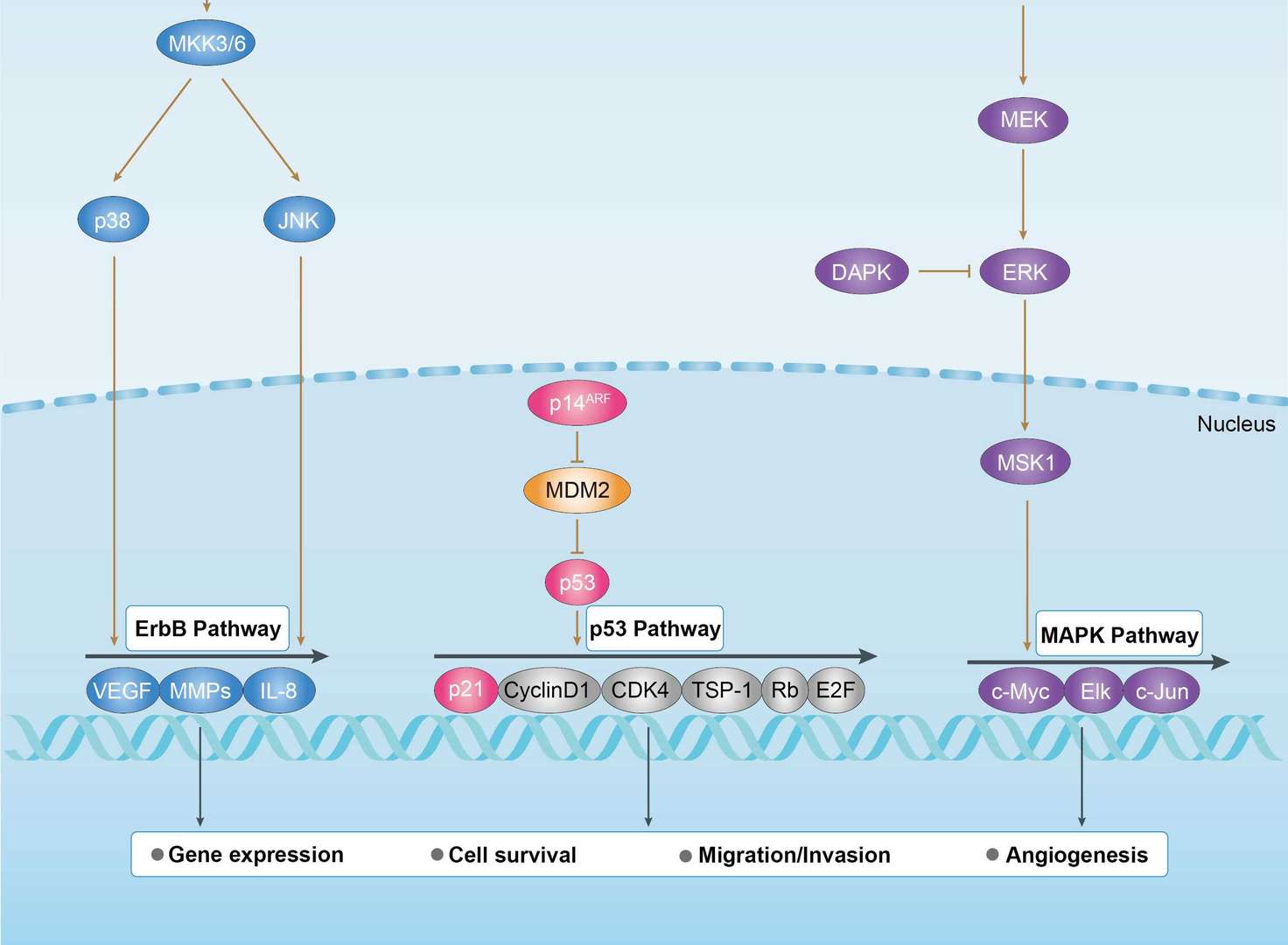 Bladder Cancer
Bladder Cancer
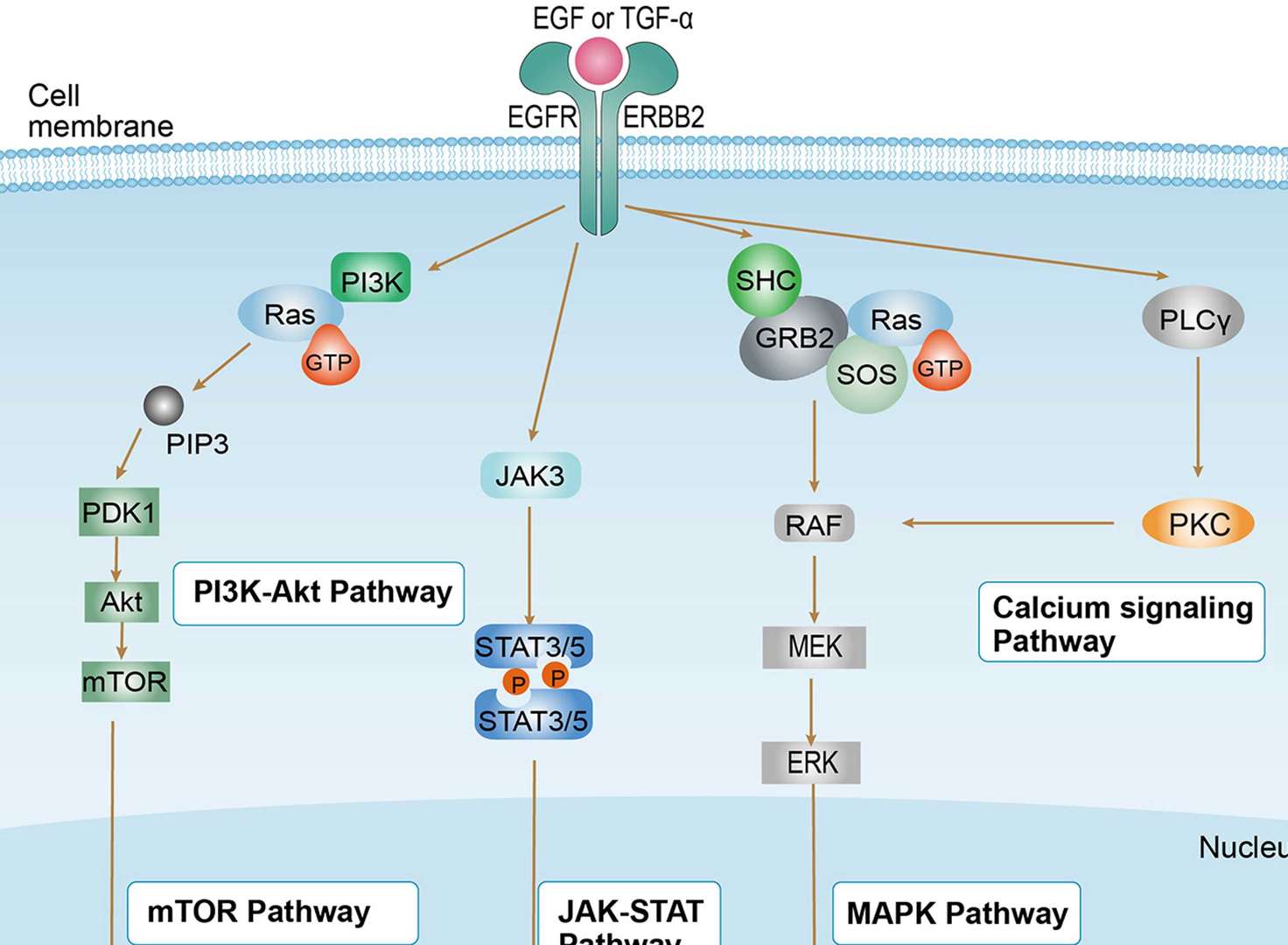 Non-small Cell Lung Cancer
Non-small Cell Lung Cancer
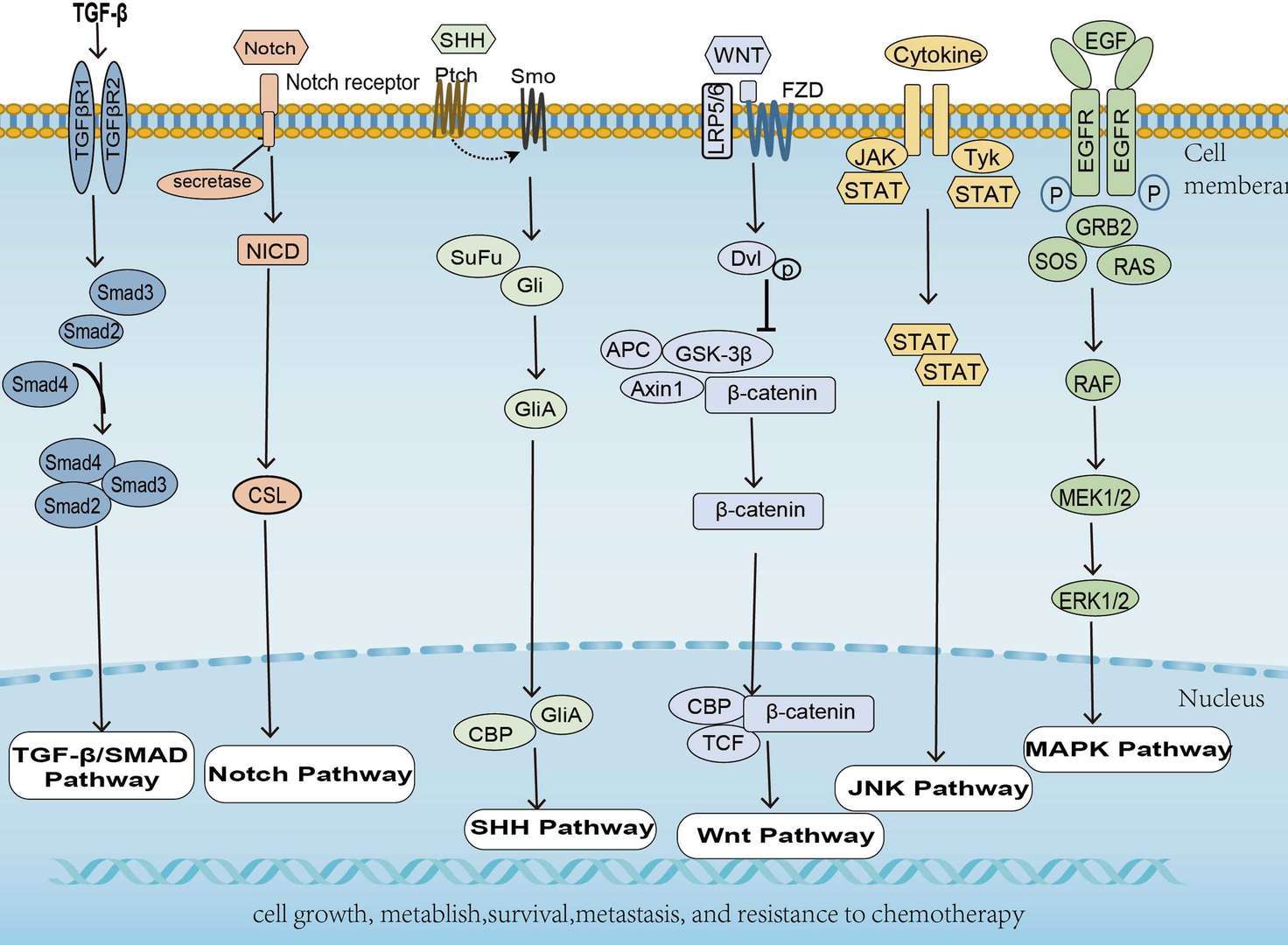 Pancreatic Cancer
Pancreatic Cancer
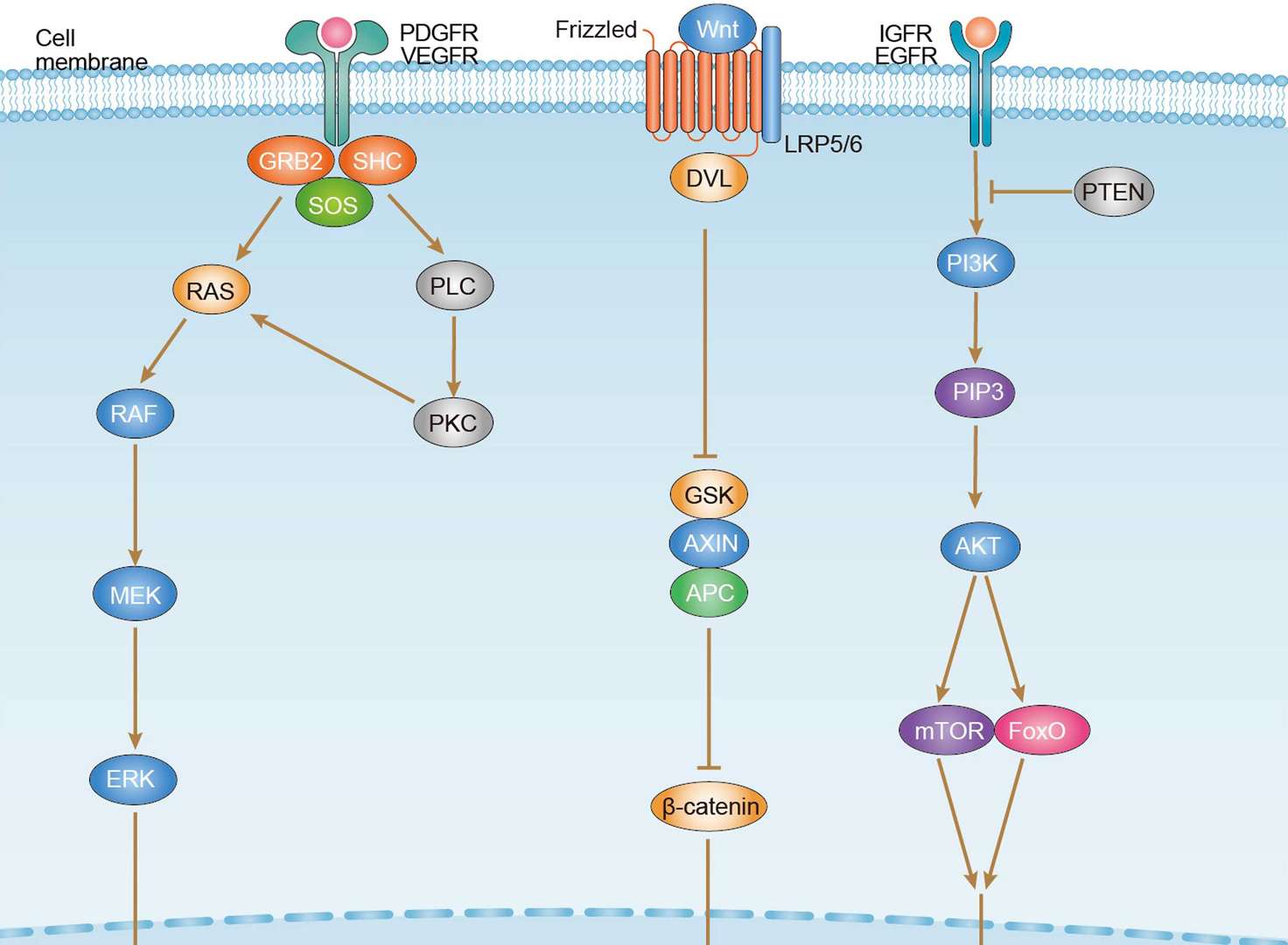 Hepatocellular Carcinoma
Hepatocellular Carcinoma
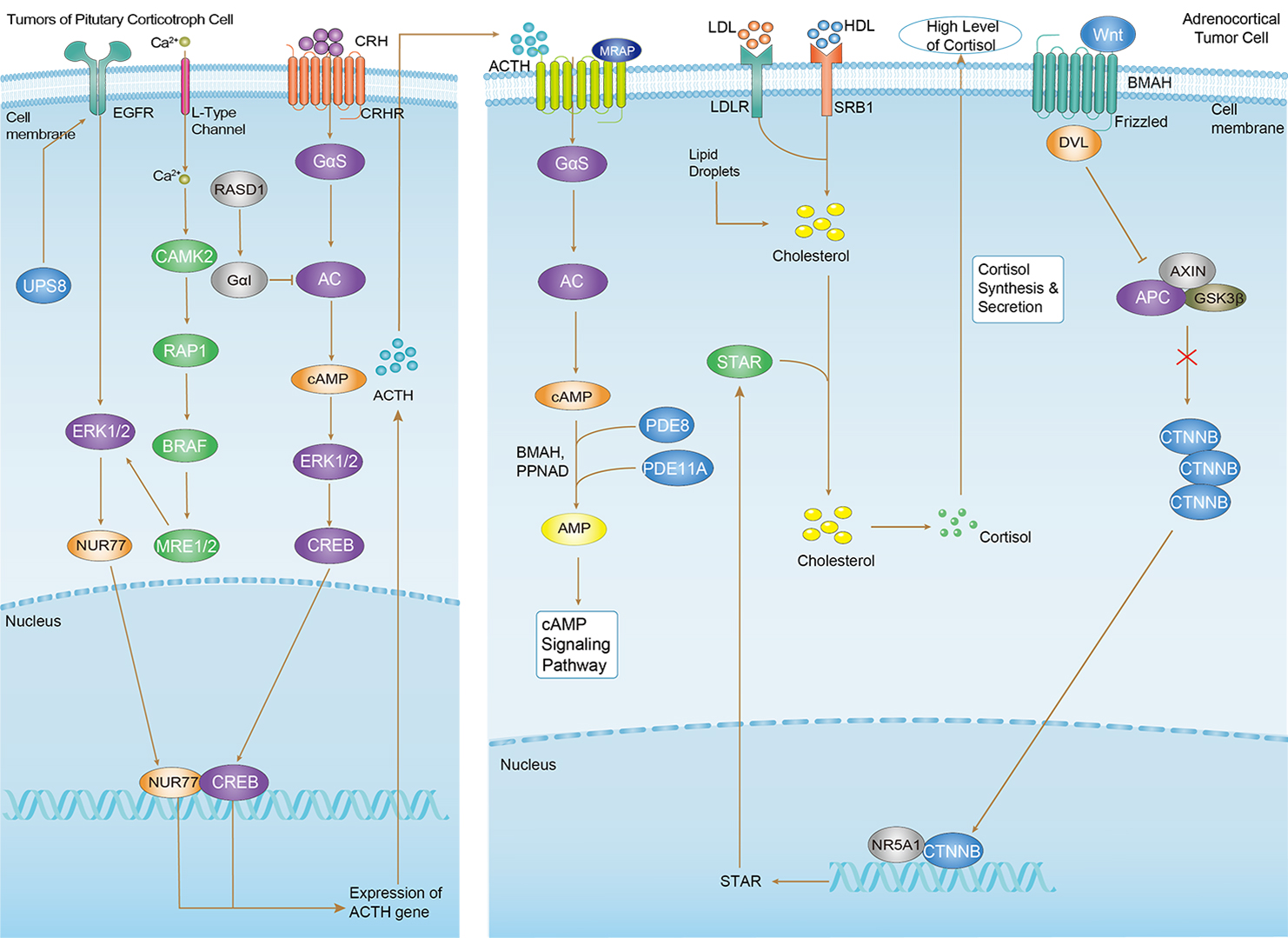 Cushing Syndrome
Cushing Syndrome
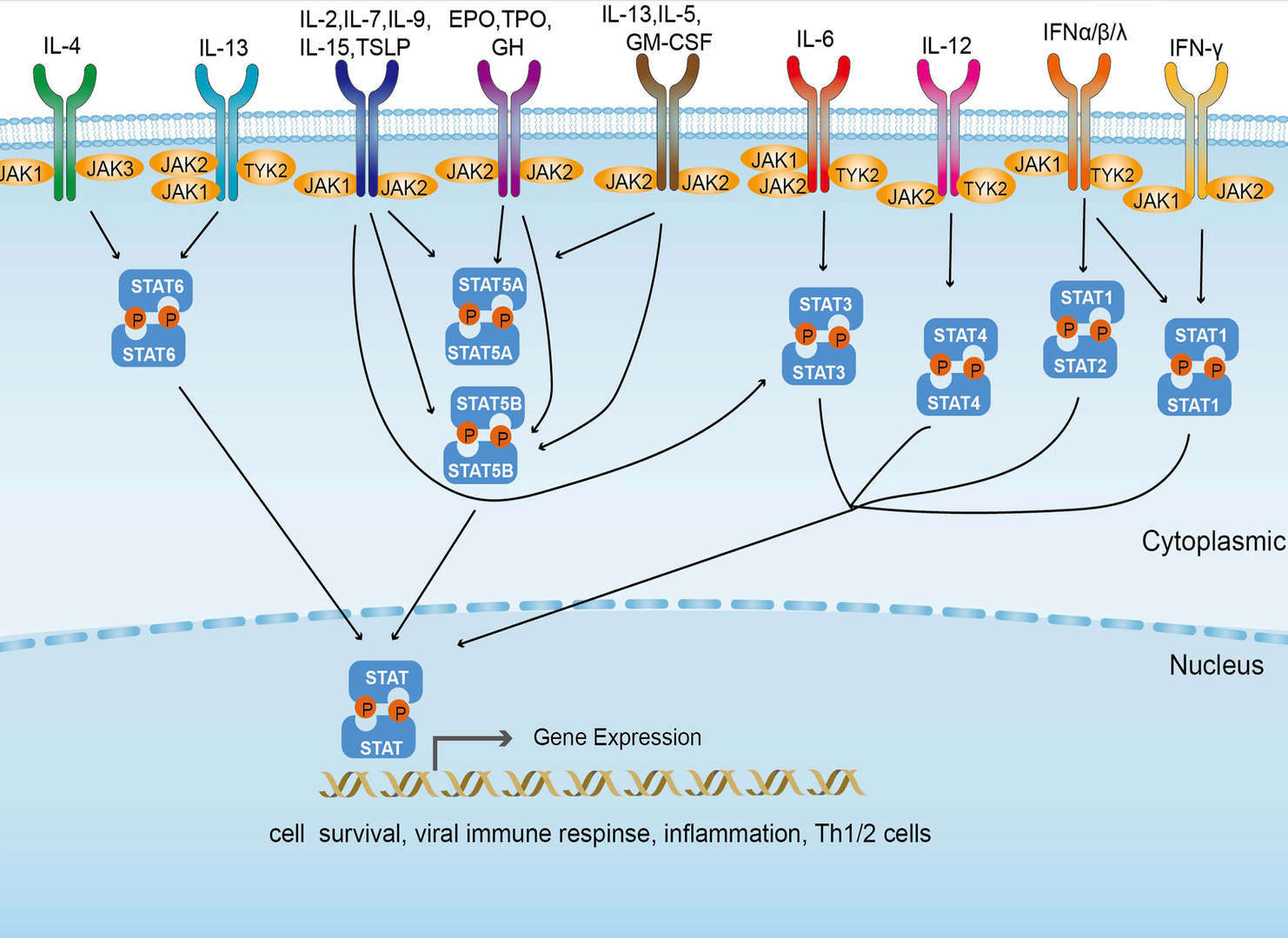 JAK-STAT Signaling Pathway
JAK-STAT Signaling Pathway